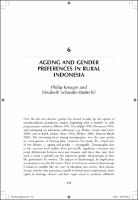Chapter 6 Ageing and Gender Preferences in Rural Indonesia
Author(s)
kreager, philip
Schroeder-Butterfill, Elisabeth
Collection
WellcomeLanguage
EnglishAbstract
This chapter draws on the longitudinal ethnographic and demographic
field study of three communities representing major Indonesian ethnicities
(Javanese, Sundanese, and Minangkabau), located in three of the five
provinces that, since 1990, have reported more than 7 per cent of
the population over the age of 60. Comparative ethnographic study
supported by panel surveys enables us to establish contexts and variations
in family and community support for older people, and the advantages
and disadvantages that may accrue in consequence to older men and
women. Similar patterns of socio-economic stratification exist in the three
communities, which have an important bearing on elderly well-being,
notably by influencing the supply of children, family network size and
structure, and intergenerational exchanges. Following a brief introduction,
in which the communities and research methodology are described, the
chapter notes two contrasting preference structures that differentiate
gender in the communities. Gender has a marked structural significance
in matrilineal societies, like the Minangkabau, that is not manifest for
the Javanese and Sundanese. Case studies then illustrate some aspects of
these structures. The chapter concludes with a brief look to the future,
by considering the expectations of current working age generations about
their own later lives, and the limitations of relying exclusively on aggregate
data to assess their likely policy needs.
Book
Gender and AgeingKeywords
ethnographic studies; longitudinaal ethnographic; demographic field study; Javanese: Sundanese; Minangkabau; ageing; gender preferencesISBN
9789814517973, 9789814517980Publisher
ISEAS PublishingPublication date and place
2015Grantor
Classification
Gender studies, gender groups


 Download
Download